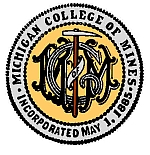In March 1861 the Michigan Legislature passed Public Act 207, signed by the governor, to establish the Michigan Mining School at Houghton. It would have been the first mining college in the nation if the Civil War had not blocked appropriations. Mining Engineering was the first department established when the Michigan School of Mines opened in Houghton in 1885, dedicated exclusively to "mining and mining engineering." In over 126 years of its history, over 800 mining engineers have graduated from Michigan Tech.
 Mining engineers require a broad understanding of basic sciences, engineering,
and economic principles. General education, communications skills, and
comprehension of social factors are also important, since engineers
often assume managerial functions within the mining industry.
Mining engineers require a broad understanding of basic sciences, engineering,
and economic principles. General education, communications skills, and
comprehension of social factors are also important, since engineers
often assume managerial functions within the mining industry.
To obtain these skills, the mining curriculum at MTU is structured accordingly. During the first two years, mining engineering students take many of the same sources that most engineers take, such as mathematics, physics, chemistry, engineering mechanics, english communication, computer science, economics, and geology. After completing fundamental courses, students take advanced science and engineering studies in fluid mechanics, thermodynamics, electric circuits and machinery, followed by professional mining classes in drilling and blasting, materials handling, rock mechanics, mine health and safety, mine ventilation, mine cost engineering, ore reserve analysis, operations analysis, mine planning, and minerals processing. Elective courses allow students to concentrate their studies in specific areas. These courses prepare graduates for entrance into the mining engineering profession, as well as provide a good background for more-specialized studies or advanced administrative positions.
The Michigan Tech Mining Engineering degree program offers advantages associated with a friendly learning environment and closely knit educational support group. These conditions allow students to interact more freely with other students and faculty, resulting in a more in-depth understanding of their prospective careers and better than average job placement.
Mission
The mission of the Mining Engineering degree program is to continue to improve and maintain quality undergraduate and graduate programs supported by an up-to-date curriculum and innovative research, and to produce technically competent mining engineers who possess team skills and are cognizant of the changing needs of an environmentally sensitive society.
Objectives
The educational objectives of the B.S. program require that graduates meet a large number of criteria including the following:
- Possession of a strong fundamental scientific and technical knowledge base, and critical thinking skills, which will serve as the foundation for life-long learning;
- The ability to apply science and engineering skills to the analysis and design of engineering projects;
- The ability to effectively communicate technical/professional information in written, oral, visual, and graphical formats; and
- An awareness and understanding of professional obligations to protect human health, human welfare, and the environment.
Vision
The vision of the Mining Engineering degree program is to prepare men and women to assume active leadership roles in industry, satisfying present and future needs of a global society through the development and implementation of revolutionary technologies for the extraction of mineral resources, and construction of underground structures in a socially responsible, economically viable, and environmentally sound manner.
The Bachelor of Science in Engineering (BSE) program for Mining Engineering is administered through the BSE Degree program


